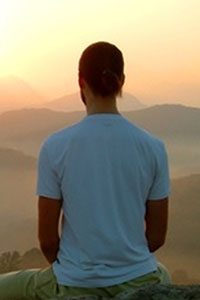Discovering that today is World Philosophy Day inspired me to reflect on the relationship of meditation and philosophy. It all started when Richard showed me this BBC article by David Bain -- Four Philosophical Questions to Make Your Brain Hurt. I'm not particularly fond of having my brain hurt, but I am fond of philosophy. This fondness isn't about reading philosophy, as that can make my brain hurt. It is more about a natural tendency I have to question things. It's about having a mind that's always exploring the meaning and nature of things.
When I was in college, I took a vocational aptitude test. The idea was to help discover what I would be good at as a profession. When I met with my advisor to learn the results of the test, he scratched his head and looked perplexed. Poring over the results, he said that it appeared that my abilities would make me well suited to be an "armchair philosopher". Since this didn't offer a path to earning income, he scrambled around for another option -- sales. Well, selling things has never been my forte, and I certainly haven't earned a living through philosophizing.
What's interesting to me is that my income is currently related to lifelong involvement with meditation. Thinking about it today, I see that meditation and philosophy go hand in hand for me. Both involve investigating the nature of things, the nature of oneself. With philosophy the exploration is intellectual, and with meditation it is experiential. And yet, there is a point where intellectual and experiential exploration meet and can't really be separated out.
Perhaps this is most clearly seen in the case of inquiry as a path of spiritual realization. The great sage Ramana Maharishi indicated that asking oneself the question "who I am" could ultimately result in realization of the truth of ones existence. Although the question can be answered intellectually with descriptions such as "I am a woman", "I am a doctor" and so on, taken to its final conclusion this question reveals ones nature as it exists beyond such descriptive terms.
Meditation involves a shift of attention that takes the mind out of its usual ways of perceiving and experiencing. It seems that asking philosophical questions has the potential to do the same thing.
I can't speak as a professional philosopher, but as an armchair philosopher I can say that asking questions about things we don't usually question has been part of my path with meditation. It jogs the mind from its usual assumptions and opens the perception to seeing things differently. At times, it's a great recreation for my mind. It loosens the grip of tightly held assumptions and in that sense is mind-expanding in much the same way that meditation is.
In working on this post on and off throughout the day, I ended up Googling "value of philosophy" and found the following from Bertrand Russell's Problems of Philosophy. It was fascinating to find in the last sentences a description which could just as easily have been about meditation (in bold type):
"Thus, to sum up our discussion of the value of philosophy; Philosophy is to be studied, not for the sake of any definite answers to its questions since no definite answers can, as a rule, be known to be true, but rather for the sake of the questions themselves; because these questions enlarge our conception of what is possible, enrich our intellectual imagination and diminish the dogmatic assurance which closes the mind against speculation; but above all because, through the greatness of the universe which philosophy contemplates, the mind also is rendered great, and becomes capable of that union with the universe which constitutes its highest good."
 Many people are happily meditating with our podcast and we hear from so many of you about the wonderful changes happening in your lives. It's amazing that the experience of meditation gets transmitted in this way on the web and we've been inspired to find more ways to bring meditation into peoples' lives.
Many people are happily meditating with our podcast and we hear from so many of you about the wonderful changes happening in your lives. It's amazing that the experience of meditation gets transmitted in this way on the web and we've been inspired to find more ways to bring meditation into peoples' lives.
